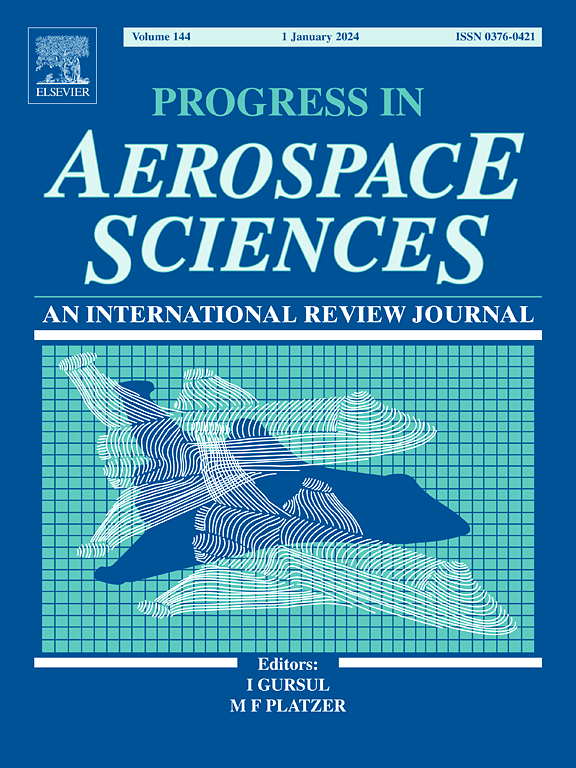可压缩涡环及其相互作用
IF 11.5
1区 工程技术
Q1 ENGINEERING, AEROSPACE
引用次数: 0
摘要
旋涡环是一种紧凑的环状结构,流体旋转时会围绕一个虚构的轴形成一个闭合的环,在许多自然现象中都会出现。这些现象产生于流体系统中的喷口或孔隙,如洞穴、火山壳、下冲或液滴下降时的短暂脉冲。大多数自然产生和实验室产生的涡旋环都被归类为不可压缩的,这些涡旋环是为了对其形成、增长、不稳定性和溶解进行基础研究而产生的。这种分类表示涡旋环内热力学特性的改变可以忽略不计。然而,在涉及火炮、冲击管、爆炸、化学作用和燃烧的过程中,会出现一类不同的涡旋环。这一类主要是可压缩旋涡环。它们在流场中的存在时间已超过一个世纪,自从应用开口冲击管来探索衍射冲击波、爆炸波与物体的相互作用以及减噪等现象以来,人们就一直在观察它们。对可压缩涡流环及其相互作用的研究和理解历来主要依赖光学技术,缺乏对错综复杂的流动动力学的全面了解。然而,21 世纪流动可视化工具和计算能力的进步极大地帮助了科学家对这些涡旋环及其相互作用的复杂细节进行研究和描述。遗憾的是,关于源自冲击管的可压缩涡旋环、其演变以及与冲击波和各种物体(包括墙壁)的相互作用的文献综述似乎还很缺乏。这篇综述文章旨在填补这一空白。本文章由计算机程序翻译,如有差异,请以英文原文为准。
Compressible vortex loops and their interactions
Vortex loops are compact toroidal structures wherein fluid rotation forms a closed loop around a fictitious axis, manifest in many natural occurrences. These phenomena result from brief impulses through vents or apertures in fluid systems, such as in caves, volcanic crusts, downbursts, or the descent of liquid droplets. The majority of naturally occurring and laboratory-generated vortex loops, studied for fundamental research on their formation, growth, instability, and dissolution, are classified as incompressible. This categorisation denotes negligible alterations in thermodynamic properties within the vortex loop. However, a distinct category of vortex loops emerges from processes involving artillery, shock tubes, explosions, chemical interactions, and combustion. This class primarily constitutes compressible vortex loops. Their presence in flow fields spans over a century, and they have been observed since the application of open-ended shock tubes to explore phenomena like diffracting shock waves, blast wave interactions with objects, and noise mitigation. The study and comprehension of compressible vortex loops and their interactions have historically relied heavily on optical techniques, lacking comprehensive insight into the intricate flow dynamics. Nevertheless, the advancements in flow visualisation tools and computational capabilities in the 21st century have significantly aided scientists in scrutinising and characterising these vortex loops and their interactions in intricate detail. Unfortunately, a comprehensive review of the literature addressing compressible vortex loops originating from shock tubes, their evolution, and interactions with shockwaves and various objects, including walls, appears lacking. This review article aims to address this gap.
求助全文
通过发布文献求助,成功后即可免费获取论文全文。
去求助
来源期刊

Progress in Aerospace Sciences
工程技术-工程:宇航
CiteScore
20.20
自引率
3.10%
发文量
41
审稿时长
5 months
期刊介绍:
"Progress in Aerospace Sciences" is a prestigious international review journal focusing on research in aerospace sciences and its applications in research organizations, industry, and universities. The journal aims to appeal to a wide range of readers and provide valuable information.
The primary content of the journal consists of specially commissioned review articles. These articles serve to collate the latest advancements in the expansive field of aerospace sciences. Unlike other journals, there are no restrictions on the length of papers. Authors are encouraged to furnish specialist readers with a clear and concise summary of recent work, while also providing enough detail for general aerospace readers to stay updated on developments in fields beyond their own expertise.
 求助内容:
求助内容: 应助结果提醒方式:
应助结果提醒方式:


